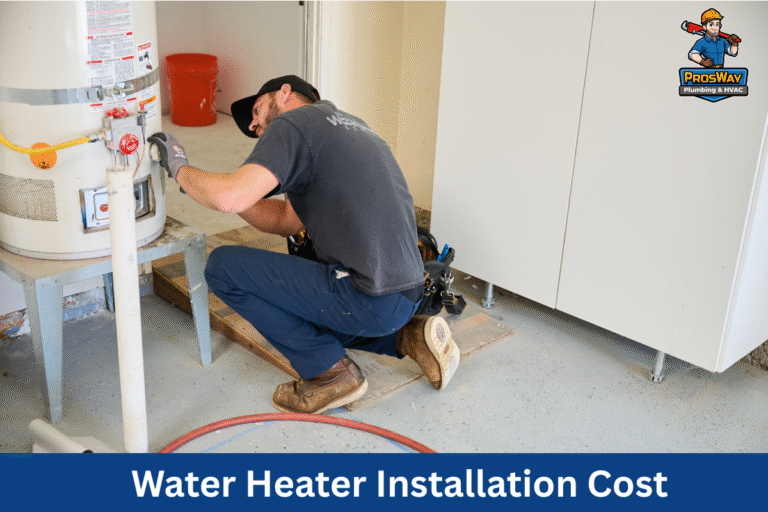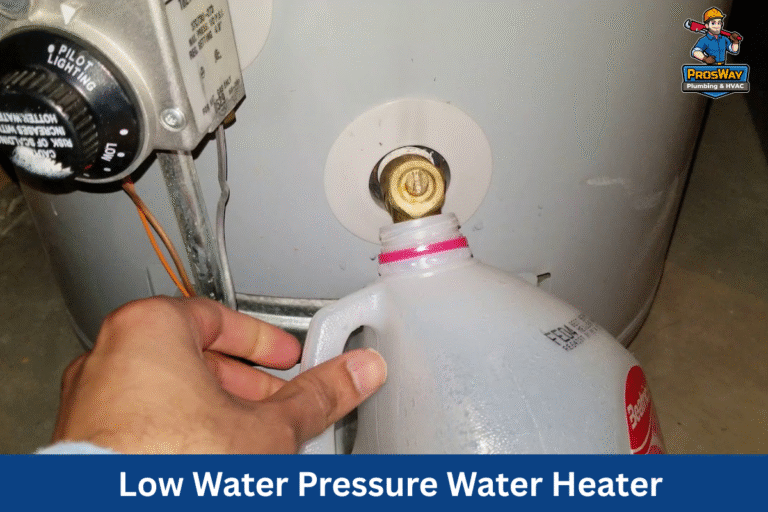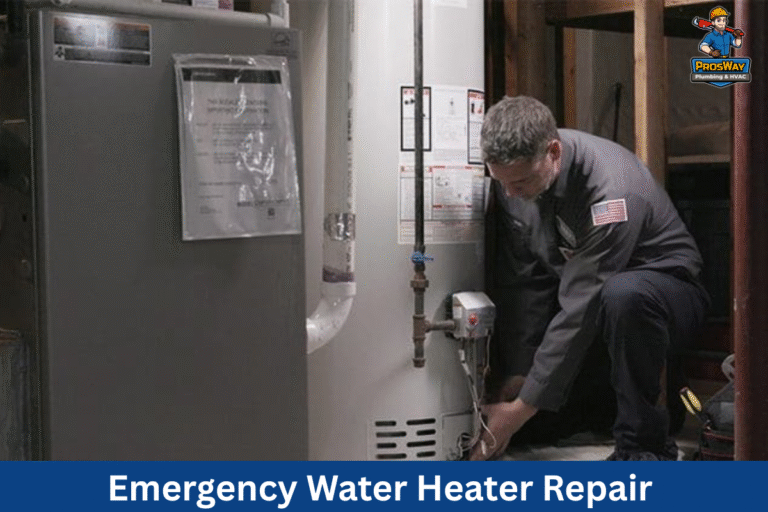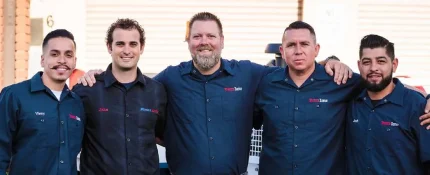Homeowners in Northern New Jersey looking for repair or replacement options need to understand the differences between PVC and cast iron sewer lines. For most homes in Northern New Jersey, PVC sewer lines are often the better choice due to their affordability, resistance to corrosion, and ease of installation. However, cast iron is still valued for its durability and sound insulation, making the right choice dependent on your specific needs and property conditions.
This article reviews what these pipes are made of, their common applications, cost implications, and performance under various conditions. For those seeking professional insight, contacting Prosway Plumbing and HVAC can provide valuable guidance on which is better for sewer lines PVC or cast iron?.
What Makes PVC Sewer Lines Popular?
PVC sewer lines are popular in modern residential plumbing because they combine durability, affordability, and ease of installation. PVC, short for polyvinyl chloride, is a plastic known for its excellent resistance.
It is primarily used for carrying wastewater away from the home and for drainage. Its lightweight properties make handling and installation simpler.
What Are PVC Pipes Made Of?
PVC pipes are manufactured from polyvinyl chloride, a synthetic thermoplastic polymer enhanced with stabilizers, lubricants, and plasticizers.
These additives improve flexibility and strength while ensuring the piping withstands chemical attacks from acids, alkalis, and other common underground substances.
The extrusion process creates consistent wall thickness and a smooth interior that helps reduce friction and debris buildup. You can watch this video: How it’s made: PVC Pipe Making Factory | PVC Pipe Manufacturing Process.
Common Applications for PVC in Sewer Systems
Due to its versatility, PVC is used in residential wastewater drainage, stormwater management, and some industrial applications. Its low cost and ease of installation make it ideal for new construction.
The smooth interior facilitates free liquid flow, reducing the risk of clogs; additionally, its chemical resistance makes it suitable for environments with mild chemical exposure.
Lifespan Expectations for PVC Sewer Lines
Under normal conditions, PVC sewer lines can last between 50 and 100 years. Their longevity results from resistance to chemical attack, corrosion, and weathering.
Although not as strong as metal in load-bearing situations, proper installation and routine maintenance can ensure reliable performance over decades.
What Does PVC Piping Typically Cost?
PVC is significantly cheaper than cast iron. Lower material costs and simplified installation reduce labor expenses. For homeowners considering sewer line replacements or new installations in Northern New Jersey.
PVC offers an economical solution without compromising quality, though potential issues like noise and temperature sensitivity should be considered when planning the project.
Why Is PVC a Good Choice for Sewer Lines?
PVC sewer lines offer several advantages that make them a common choice in residential plumbing. Key benefits include performance, ease of installation, and long-term cost efficiency.
Corrosion Resistance Benefits of PVC
PVC’s non-metallic nature means it does not rust or corrode like metal pipes. In aggressive chemical conditions caused by wastewater.
PVC remains inert and prevents leakage from material degradation. This reliability helps minimize disruptions and repair costs, especially in areas with acidic soils or water. leaking pipes.
Lightweight Nature and Ease of PVC Installation
Being much lighter than cast iron, PVC pipes are easier to handle and require less heavy equipment during installation. Joining PVC via solvent welding and using prefabricated fittings streamlines.
The process, reducing construction time and labor costs, is a significant advantage in regions where
and minimal disruption are important.
Cost-Effectiveness of PVC Sewer Pipe Materials
Both material and labor costs for PVC are lower than for cast iron. Its long lifespan of up to 100 years under ideal conditions offers excellent value for money.
For extensive piping projects, PVC’s affordability is a major benefit, making it an attractive option for many residential sewer installations.
Smooth Interior Surface and Reduced Clogging in PVC
PVC’s smooth interior minimizes friction and prevents the accumulation of debris and sludge, reducing the risk of clogs.
This efficient water transport leads to fewer service interruptions and lower maintenance needs, especially in high-use residential settings.
Chemical Resistance Properties of PVC Pipes
The chemical inertness of PVC allows it to reliably channel wastewater without reacting with acidic or alkaline substances. This property helps keep ambient noise and repair costs low.
It ensures consistent system performance over time. For more information on repairs, you can visit our
services.
What Are the Drawbacks of Using PVC Pipes?

Despite its many strengths, PVC has limitations that homeowners should consider carefully.
Potential for Noise With PVC Pipe Systems
Under turbulent flow or high speeds, PVC pipes can produce a “water hammer” effect or banging noise. This issue is more common in quiet residential areas where even minor noise can be noticeable.
Some installers mitigate this with cushioning materials or careful layout design, but noise remains a concern in high-flow conditions.
Temperature Limitations and Heat Sensitivity of PVC
PVC softens at elevated temperatures and may lose structural integrity when exposed to extreme heat. While this is typically not an issue in cooler climates, areas with high ambient temperatures.
Or proximity to heat sources (like water heaters) might result in deformation issues. This limits PVC’s use in certain industrial applications.
UV Sensitivity and Outdoor Exposure for PVC
Though buried PVC generally performs well, prolonged exposure to ultraviolet (UV) radiation can make the material brittle and discolored.
For any exposed or outdoor sections of piping, additional protective coatings or burial methods are necessary to prevent UV damage.
Structural Strength Compared to Cast Iron
While adequate for most residential use, PVC does not match the structural robustness of cast iron. Its lighter weight and lower tensile strength mean it may not cope as well with heavy external loads.
Such as those encountered in high-traffic areas. For installations with significant load-bearing requirements, cast iron may be preferred.
What Is the Environmental Impact of PVC?
PVC is derived from non-renewable fossil fuels, and its production generates pollutants. Recycling options for PVC are limited compared to metals.
These environmental drawbacks may influence the decision for homeowners focused on green building practices.
What Makes Cast Iron Sewer Pipes Durable?
Cast iron has a long-standing reputation in sewer and plumbing systems for durability and strength. Despite modern alternatives like PVC, cast iron remains popular where robustness and sound dampening are essential.
What Are Cast Iron Pipes Made Of?
Cast iron pipes are manufactured by melting iron and casting it into molds, creating a dense and robust material.
They are usually coated with a protective layer such as bitumen to help prevent corrosion. The inclusion of reinforcing ribs during manufacturing.
Further enhances cast iron’s strength and durability. Piping and repiping are essential for maintaining the integrity of such pipes.
Where Has Cast Iron Been Used in Sewer Systems?
Historically, cast iron was the material of choice for constructing sewer systems in urban areas due to its reliability in handling high pressures and heavy loads.
Many older municipal and residential systems still use cast iron due to its proven track record in durability, fire resistance, and sound insulation.
Expected Durability and Lifespan of Cast Iron Pipes
Cast iron sewer lines can last between 75 and 100+ years when properly maintained. Their impressive longevity is due to inherent strength and resistance to heavy loads.
However, ongoing maintenance, particularly for protecting against rust and corrosion, is essential to fully realize this long lifespan.
What Does Cast Iron Piping Typically Cost?
Cast iron pipes are more expensive than PVC, both in terms of material costs and labor required for installation. Their heavy weight necessitates specialized equipment.
Maintenance and repair expenses over the lifecycle can also be higher, though the extended service life can sometimes offset these initial investments.
Why Choose Cast Iron for Sewer Lines?

Cast iron is highly valued in sewer applications for several key reasons, including its strength, durability, and long-term performance advantages.
What Makes Cast Iron Pipes Strong Under Pressure?
Cast iron’s high density and structural integrity mean it can withstand significant external pressures from soil and traffic.
This makes it ideal for under-road installations, multi-story buildings, and other high-load environments where structural stability is critical.
Its robust strength provides peace of mind that the sewer system will remain intact under extreme conditions.
Fire Resistance Capabilities of Cast Iron Pipes
One of cast iron’s standout features is its inherent fire resistance. Unlike PVC, cast iron does not melt or release toxic fumes in high-temperature situations.
This makes it a safer choice in areas where fire risk is a concern, ensuring that the maintains its structural integrity under extreme conditions.
Sound Dampening Qualities for Quieter Operation
Cast iron naturally dampens sound due to its thick, dense structure. This quality significantly reduces the noise generated by water flow, making it particularly suited for multi-family housing.
And urban environments where minimized noise is highly valued. The reduction in water hammer and other flow noises enhances overall residential comfort.
Longevity and Long-Term Performance of Cast Iron
With proper maintenance, cast iron pipes can reliably operate for more than a century. Although the initial investment is higher, the extended lifespan and proven durability often justify the cost.
This predictability in long-term performance can reduce the likelihood of future disruptive repairs or replacements.
Resistance to Extreme Temperatures
Cast iron is highly resistant to both extreme cold and intense heat. Its ability to maintain structural integrity through severe temperature fluctuations.
Makes it suitable for regions with harsh winters or hot summers. This resilience ensures consistent operation without the risks of cracking or deforming.
What Are the Downsides of Cast Iron Sewer Pipes?
While cast iron offers many benefits, it also comes with several disadvantages that may affect its overall appeal.
Susceptibility of Cast Iron to Rust and Corrosion
Cast iron is prone to rust if its protective coating is compromised. Exposure to moisture, salts, and chemicals can lead to corrosion.
And internal scaling, reducing flow efficiency. Regular inspections and maintenance are necessary to manage these issues, potentially increasing long-term costs.
How Does Cast Iron’s Weight Affect Installation?
The substantial weight of cast iron pipes makes them difficult to handle and install. Specialized equipment and skilled labor are often required, increasing installation time and costs. This heavyweight can also complicate repairs and make cast iron less suitable for DIY projects.
Higher Initial Material and Labor Costs for Cast Iron
The higher cost of both materials and labor for cast iron compared to PVC is a significant consideration. Although cast iron offers superior durability and performance in some situations, the upfront investment may be prohibitive for budget-conscious individuals.
Potential for Interior Scale Buildup Over Time
Over time, cast iron pipes may accumulate mineral deposits and scale on their interior surfaces. This gradual buildup can restrict flow. Eventually it led, to necessitating periodic cleaning or even replacement of affected sections.
Challenges With Repair and Maintenance of Cast Iron
Repairing cast iron sewer lines is generally more invasive and costly than working with PVC. The heavy weight and risk of additional corrosion or rust mean that repairs often require extensive excavation and specialized techniques, further adding to the maintenance burden.
Comparison Table: PVC vs. Cast Iron Sewer Lines
The table below summarizes key attributes of PVC and cast iron sewer lines to help you compare their benefits and drawbacks efficiently.
| Attribute | PVC Sewer Lines | Cast Iron Sewer Lines |
|---|---|---|
| Material Composition | Polyvinyl chloride (plastic) | Molten, cast iron with protective coatings |
| Installation Ease | Lightweight and easy to install | Heavy and requires specialized equipment |
| Cost | Lower material and labor costs | Higher initial and repair costs |
| Corrosion Resistance | Excellent chemical resistance | Susceptible to rust if the coating fails |
| Lifespan | 50 to 100 years | 75 to 100+ years |
| Sound Dampening | Can be noisy under high flow conditions | Excellent sound insulation |
| Temperature Sensitivity | Sensitive to high temperatures and UV | Maintains strength in extreme temperatures |
| Maintenance | Easier upkeep and minimal maintenance | Requires regular inspections and maintenance |
| Environmental Impact | Derived from non-renewable fossil fuels | Heavy but longer-lasting; repair can be complete |
Final Thoughts
Both PVC and cast iron sewer lines come with distinct pros and cons. PVC stands out for its affordability and resistance to corrosion and clogging, making it a practical choice for many residential projects. On the other hand, cast iron offers unmatched durability, sound insulation, and fire resistance, but requires a larger upfront investment and more complex maintenance.
For Northern New Jersey homeowners, the right choice depends on your property’s conditions, budget, and long-term goals. Speaking with a local expert can help you choose the best option for a reliable and efficient sewer system that fits your needs.
Frequently Asked Questions
How do PVC sewer lines compare in longevity to cast iron pipes?
PVC sewer lines can last between 50 to 100 years with proper maintenance, while cast iron pipes often operate reliably for 75 to 100+ years.
Although cast iron typically has a longer lifespan, its durability depends on regular maintenance to prevent rust and scale buildup.
Are there noticeable differences in installation processes for PVC versus cast iron sewer lines?
Yes. PVC pipes are lightweight and simpler to install, leading to lower labor costs and quicker installation times.
In contrast, cast iron pipes are heavy, require specialized equipment, and involve more complex installation procedures, thereby increasing overall project costs.
Does cast iron provide any benefits regarding noise reduction in sewer systems?
Absolutely. Cast iron naturally dampens noise due to its density, resulting in quieter operation, which is especially beneficial in multi-family or urban settings where reduced noise is a priority.
What maintenance challenges might I face with cast iron sewer lines?
Cast iron is more prone to rust and corrosion if protective coatings are damaged, and interior scale buildup can restrict flow.
Repairs are generally more complex and invasive compared to PVC, often requiring specialized labor and extensive excavation, which can make ongoing maintenance more expensive.
How does the environmental impact of PVC compare to that of cast iron?
PVC is made from non-renewable fossil fuels and poses recycling and pollution challenges. Cast iron, while requiring more energy to produce and handle, typically lasts much longer.
Which may result in fewer replacements over time. Both materials have environmental trade-offs that should be weighed against performance requirements.
Need Help Choosing the Right Sewer Line? Call ProsWay
Not sure whether PVC or cast iron is best for your home? Contact ProsWay Plumbing & HVAC today for expert advice and reliable installation across Northern New Jersey. Call us now at (862) 260-5870 or Book Online for consultation — get a solution that lasts.








